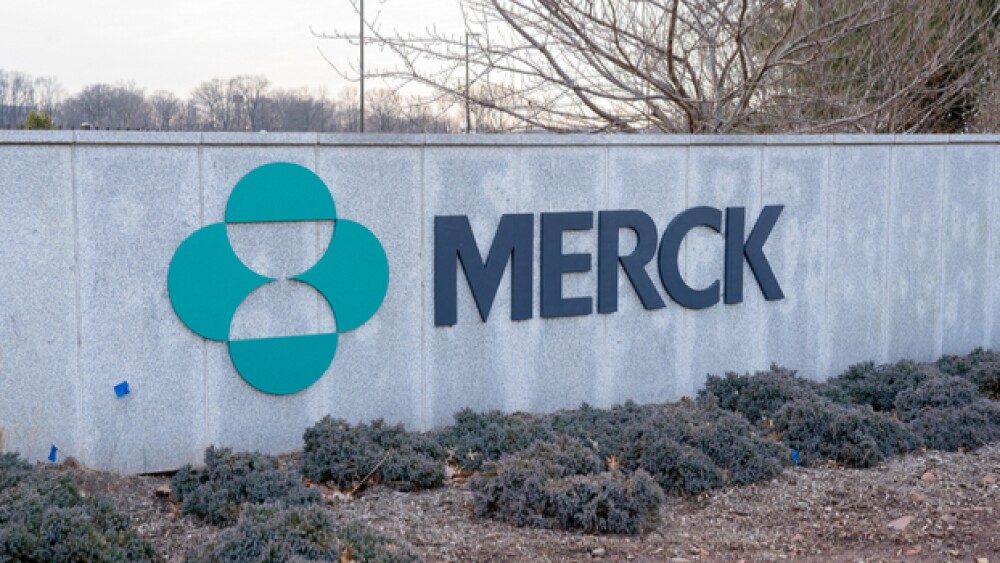Under the terms of the deal, a Merck subsidiary is buying all outstanding shares of Tilos for a total of up to $773 million, including an upfront payment and various potential milestone payments.
JHVE Photo / Shutterstock
Kenilworth, NJ-based Merck & Co. is buying Lexington, Mass.-based Tilos Therapeutics in a deal that could hit $773 million.
Tilos focuses on developing drugs that target the latency-associated peptide (LAP)-TGF beta complex to treat cancer, fibrosis and autoimmune diseases. TGF beta stands for transforming growth factor beta. The company was founded based on the research of Galina Gabriely and Howard Weiner at the Brigham and Women’s Hospital. Weiner’s work focused on serious autoimmune diseases, which led to LAP and the expression of LAP on suppressive cell populations. The laboratory developed antibodies to LAP, which have an effect on tumor growth.
“At Merck we continue to enhance our robust pipeline through active execution of our business development strategy,” stated Dean Li, Senior Vice President of Discovery and Translational Medicine at Merck Research Laboratories. “Tilos has developed a compelling portfolio of candidates that employ a novel approach to modulating the potent signaling molecule TGF beta by binding to latency-associated peptide, with potential applications across a range of disease indications.”
Under the terms of the deal, a Merck subsidiary is buying all outstanding shares of Tilos for a total of up to $773 million, including an upfront payment and various potential milestone payments.
Tilos was founded by Boehringer Ingelheim Venture Fund and Partners Innovation Fund. Additional investment was by ShangPharma Innovation Fund.
TGF beta is secreted with LAP. LAP creates a cage around TGF beta, holding it in an inactive state until it is needed. Research has indicated that anti-LAP antibodies block the release of TGF beta from the TGFB-LAP complex.
“We are proud that the Tilos team has advanced the discoveries of our scientific founders by developing a portfolio of anti-LAP antibodies designed to realize the full potential of TGFB-modulating therapeutics,” stated Barbara Fox, chief executive officer of Tilos. “This agreement with Merck, an industry leader in biopharmaceutical research and development, provides meaningful validation for our therapeutic approach and best positions our pipeline for broad clinical and commercial success.”
TGF beta is produced by a broad spectrum of immune cells. When activated, it can promote cancer by several different mechanisms, including angiogenesis and metastasis and by stimulating the development and differentiation of Tregs (T regulatory cells) and other immunosuppressive cell types. Tilos’ approach is to prevent the activation and release of mature TGF beta.
The primary focus has been in cancer with testing of the anti-TGFB antibodies with checkpoint inhibitors. The antibodies are being investigated in melanoma, glioblastoma and colorectal cancer. Other cancers include renal, hepatocellular, lung, breast and pancreatic cancers. It also has potential for treatments for various autoimmune diseases and fibrosis.
Merck is interested in ways of broadening the potential of its checkpoint inhibitor Keytruda (pembrolizumab). Although in many ways a miracle drug, only a small percentage of patients respond to checkpoint inhibitors like Keytruda. Anti-TGFB may help with the effectiveness of checkpoint inhibitors.
This deal is the third cancer-focused deal Merck has made recently. It acquired Immune Design in February for $300 million and in May bought Peloton Therapeutics for $2.2 billion.
Newsletter Sign Up
Sign up to get the latest life sciences news and updates delivered straight to your inbox.





